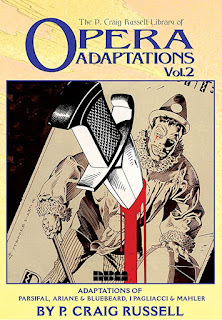P. Craig Russell adapts operas into comics. He's been doing it since nearly the beginning of his career, and I see from his bibliography list on Wikipedia that he has a few adaptations of songs from this past decade, though they're still unpublished.
And what I have today is the second book collecting that work, the grandly titled The P. Craig Russell Library of Opera Adapations, Vol. 2. (It followed a full-volume version of Mozart's The Magic Flute and was followed by a third miscellaneous book; with those songs from the past few years, there may be enough material for a Vol. 4 at this point.) It's a 2003 book, collecting four adaptations spanning the late '70s to the late '90s, and Russell worked with different collaborators on each of them, some more involved than others. I'll take them each separately: Parsifal, Songs by Mahler, Ariane & Bluebeard, and I Pagliacci.
Parsifal is the oldest piece here, originally published as a single-issue comic by Star*Reach in 1978. Patrick C. Mason adapted the Wagner opera and wrote the script; Russell drew it. It only adapts the second act of the opera, but that's enough drama and then some: Mason also adds in a lot of narration in that '70s comics style, some of which may transmute lyrics or stage directions. It's a very wordy piece as well as being super-dramatic, with an amnesiac young knight being tempted by an immortal witch while searching for a holy relic (the spear that wounded Jesus during the crucifixion), and all those words do constrain Russell's visual inventiveness here - it's a weird '70s comic, but still a sequence of pages of people explaining their emotions to each other at great length, and so not a million miles away from a contemporary Chris Claremont joint.
Songs by Mahler is the shortest section, with two songs, three pages each, from 1984. The first is credited as translated by Mason; the second has no credits other than Russell. These are more imagistic, less narrative, and much more successful as comics, even if they're not stories.
Ariane & Bluebeard is from 1988, and doesn't credit anyone other than Russell; so I guess he translated Paul Dukas's French opera and scripted this forty-page version. This showcases Russell's design sense, his use of color, and his eye for high drama - there are great, striking pages here, including a few wordless ones, showing he'd gotten to a point of confidence in his art to reproduce the feeling of the music of an opera without needing to explain. This is even more dramatic than Parsifal, largely because Russell is in better control of the material, and opera is super-dramatic - at least, the ones Russell is most drawn to adapt; I don't think he'll do Einstein on the Beach anytime soon - to begin with. The opera is the old Bluebeard folktale: young woman is married to an older man with a secret, who has been married several times before (and the fate of those brides is the secret), and she learns the secret, amid a lot of loud singing.
Last up is the black-and-white The Clowns (I Pagliacci), from 1997. This one was translated by Marc Andreyko from Leoncavallo's opera, laid out by Russell, penciled and lettered by Galen Showman, and inked by Russell. The art is striking, the adaption is swift and assured, and the story is presented well - a traveling troupe arrives in a town, and art imitates life as both the character of the leading lady and the woman herself have an affair, which ends in death at the hands of the title clown. This is less visually inventive than Ariane, but tighter and clearly focused - I'd say it's the best piece in the book, but that may be partly individual taste. (I like Russell's vibrant colors and big layouts, but find them a bit too much some of the time, and Ariane is full of that stuff.)
Again, if you want comics adaptations of operas, Russell is not only your go-to, but pretty much your only choice. Luckily, he's good at it and chooses works that adapt well.

1 comment:
Although this one's out of print, you can find most of the P. Craig Russell adaptations here:
https://nbmpub.com/collections/p-craig-russell
Post a Comment